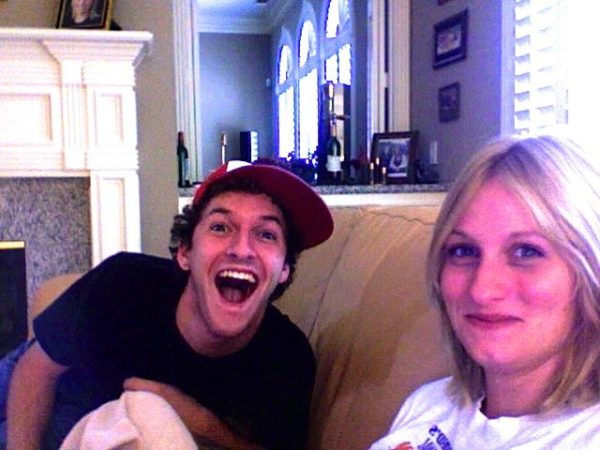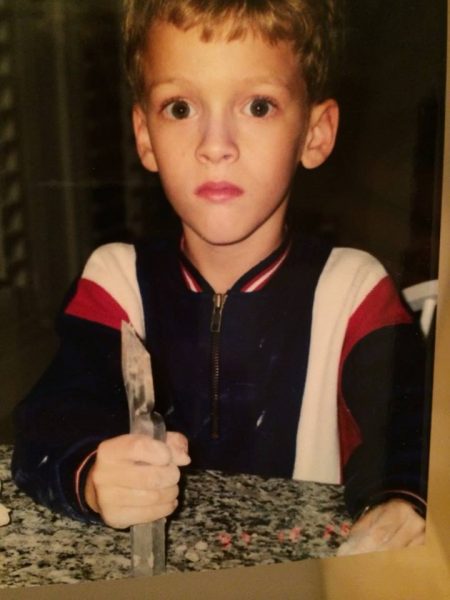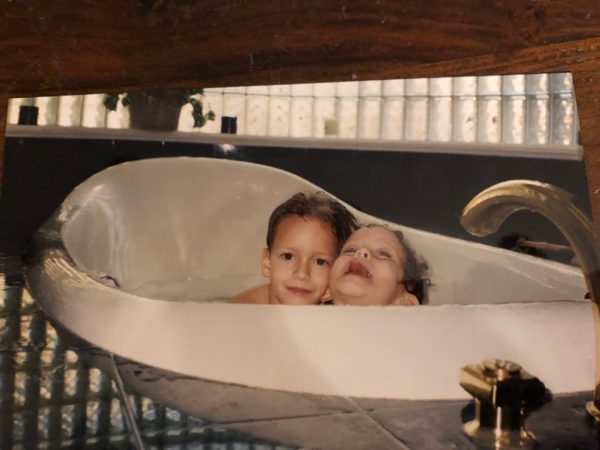This Friday we got another prank from Erik. Finally! It had been a long, long time. I’ve received two physical manifestations from my dad recently but Erik? Nada. Zip. So here’s how it went down. My daughter, Michelle, was cooking a Norwegian stew typically prepared for festive events like christenings, New Year’s Eve, Christmas, etc. It’s called små mat. For those who want to expand their language horizons by two words, this translates to “small meal.” Write that down because Norwegian is a vital language to learn, and it can come in quite handy for those of you looking to be enslaved by a hunky Viking.
The stew is called små mat because it contains potato, lamb, pork, beef and carrots (among other things) that have to be sliced methodically into tiny, perfect cubes. A meal fit for an OCD-er. So she was stirring the broth when all of a sudden, to her left, she saw the cabinet (where we store cutting boards and a lot of kitchen junk we forget we even have) open. It was entirely closed before but then slowly opened all the way. Not ajar, mind you. I’m talking wide open. Any more open and the hinges would have broken off.
Michelle felt Erik’s presence as she often does and said, “Good job! You’re really kicking ass with your powers,” or something like that. The små mat was delicious, by the way.
If you have any experiences with Erik like this, please write them down on the “Erik Encounters” page. It’s on the “About Erik” drop down menu on the top of the homepage. I encourage the rest of you to read some of the encounters that are already published.
Many of us, being Americans, suffer from hypertension, also known as high blood pressure. Here’s Erik’s take from a spiritual perspective. If you haven’t had your blood pressure taken, please do so now and once in a while.
Me: Erik, can you illuminate the spiritual basis of hypertension also know as high blood pressure? It’s so prevalent in our society as a silent killer. What’s up with that?
Jamie (grinning): He’s making his “hypertension sound.” Errrrrr. (She giggles.)
Me: What?
Jamie: He’s making a sound like his chest is too tight, and he can’t take a deep breath.
Me: Okay.
Erik: Hypertension happens to people who carry too much of a burden. They take on too much shit and won’t acknowledge it, refuse, refuse, refuse to tell other people that they’re doing too much because they don’t want to seem like they can’t handle it. Well guess what? We’ll handle it! We’ll tighten up everything in your chest to where it won’t work anymore.
Me: Great.
Erik: When I say, “we,” I’m speaking of the energetic vibrations of the body.
Jamie: He’s teasing me.
Me: As usual.
Erik: There’s no person or spirit or god standing next to you going, “All right, dude. You ain’t doing it right so we’re just going to do this to you.” But when you don’t acknowledge that you’re overstressing yourself or you’re doing something that you’re not taking pride or finding joy in, you can imagine that you’re just adding another blanket on top of you. Pretty soon, you’re doing it for ten, twenty years. You can have thousands and thousands of blankets. That’s a huge amount of weight, and slowly, your body’s adapting to it. You put on one blanket, and it’s like, “It’s all right.” You get used to it. Three? You get used to it. Five? You start to get used to it because you’re slowly layering these blankets on. I think that’s why we call it this quiet disease. We’re unaware that we’re so stressed because it’s happened so slowly, and we, as humans—
Jamie (to Erik, laughing): I can’t imitate that!
I chuckle.
Jamie tries her best to imitate Erik by shaking both fists in front of her and grimacing as she translates the following.
Erik: The most incredible thing that we do is adapt! We change! And to seem like we know what the hell we’re doing, we’ll keep adapting instead of stopping and saying, “Wait a second. I’m not even cold anymore. I don’t need any more blankets. I don’t need more burden.” We don’t know how to correct this. So our society—Boo! Hiss! Hiss! —
Jamie giggles.
Erik: –is kind of to blame for this because it’s not teaching us, as individuals, to say, “Wait. Is this okay for me? Is this all right? Have I gone past the point that I can’t come back from?” Our jobs aren’t teaching us how to do that. Can we adopt that really cool Asian thing where we come in and meditate before we come in for work, and we breathe before we do our work?
Breathing. Sounds like an excellent and novel idea. I think I’ll try it.
Erik: Then, we can sit around and have pow-wows and talk about the shit that we’re about to do, and then we do it. That would be awesome. We would learn how to check in [with ourselves] but, nope, as Americans, we are (air quotes) tools.
Me: Well, our workplaces don’t care. They just want to squeeze as much productivity out of us as they can, so there’s that fear of losing a job or a relationship, etc.
Erik: Dude!
Jamie: He’s getting all rowdy right now.
Erik: Two weeks of vacation? And, what the fuck, you get pregnant, and you get three months, no pay.
Me: So everybody get pregnant!
Erik: But Mom, you don’t even get paid sometimes! They just say, “We promise to have your job here if you decide to come back. In other countries, like Norway, they get a whole year off paid and get to stay home and raise their children. Then they can come back to their job and have their salary.
Everybody get pregnant in Norway!
Erik: We constantly fuck people over here.
Me: That’s no good.
Erik: That’s why there’s so much stress.
Me: Well it seems like in this case, and perhaps a lot of these conditions, disorders and diseases, it’s all about learning to question yourself. “Is this why I do it? Is this how I do it? What am I feeling? What’s behind that feeling?” We don’t do that very much. We don’t use our inner compass and explore to create our [inner and outer] awareness of things.
Jamie (clapping slowly): We’ve got a one man standing ovation happening.
Me: All right! That’s pretty amazing. Can you elaborate on that?
Erik: Yeah. We have trained ourselves and adapted our lives so that we learn from other people or other structures when really we should be remembering from our lives in the beyond or our other incarnations on how to listen to what we need, what you need, to ask yourself, “Is this what feels right? So many times, we take on what other people like to do or feel is appropriate, but you really need to sit down and ask, “Is red really my favorite color? Because my mom is my best friend, and I love her to death, and red is her favorite color, so it’s probably mine.” Question and challenge yourself and why you believe in what you do because you’re going to find out that more than half of it was learned from somebody else, and it wasn’t even from your firsthand experience. It isn’t what you truly believe. It’s a belief that was taught to you.
Me: Fascinating.
Erik: Sucka sucks.
Huh?
Me: Anything else [on hypertension] before we go on to the next cheerful disease?
Jamie flings her head back and laughs.
Erik: No, let’s knock ‘em down.




